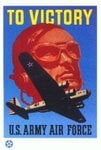trackend said:The Nazis and the Japs bloody well started it and the allies finished it and the world is a dam sight better off because of it most of us wouldn't even be around if bleeding Adolf and the Sons of Nippon had had their way. In the end they dragged the world into the gutter where morality was a very poor second to victory.
And this I agree with! Well said.
GT said:My reply to that is that the lives would be spared anyhow and all of the unnecessary casualties at Hiroshima and Nagasaki would be avoided as they were civilians.
And please explain how this would have happened.





